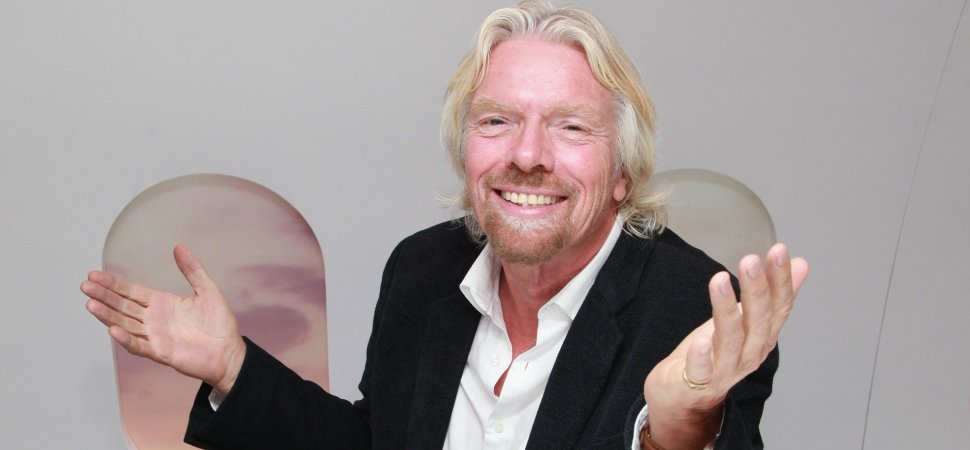Richard Branson is a force of nature.
In addition to being an actual knight, he is the founder of the Virgin Group, which now controls more than 400 companies. His net worth is $5 billion, which puts him seventh on a list of the wealthiest British billionaires. Plus, he’s known for being a compassionate boss and an icon of entrepreneurship.
He wasn’t always that successful, though.
As a boy, he struggled with dyslexia. In a blog on the subject, he wrote a letter to his younger self, saying: “I know you’re struggling at school and I wanted to give you some advice on how to become the best you can be, even when it’s difficult and you feel like the world is against you. You should never see being different as a flaw or think that something is wrong with you. Being different is your biggest asset and will help you succeed.”
Embrace his difference he did. As a teenager, he named his company “Virgin” because he lacked real experience in business.
He’s not a virgin anymore.
But no one is an island (even if they own a private one). The fact is, the mentors and influences we have growing up have a profound influence on who we become. And Richard Branson had a major advantage in that department: his mother, Eve.
Eve Branson was just as much of a force of nature as little Ricky. For example, once, on the way home from a shopping trip, Branson’s mother left him alone in the countryside. She gave him basic instructions on how to find his own way home, then left.
He was 5 years old.
In his words: “[It was] about three miles through the countryside [to get home]…. She was punishing me for causing mischief in the back seat, but she was also teaching me a larger lesson about overcoming my disabling shyness and learning to ask others for directions.”
The truth is, most mothers would not leave their 5-year-old on the side of the road to find their way home no matter what the lesson was. But Eve was fearless and bold in the way she parented…and it paid off.
It’s no wonder, then, that when Branson was asked about his best career advice for young people, it came originally from his mother. Here it is:
“Never look back in regret–move on to the next thing.”
That’s right: The best advice from one of the most successful entrepreneurs of all time has nothing to do with securing funding, or trending on social media, or hiring the perfect team.
It’s about mindset.
Others agree. Lachlan McKnight, CEO of LegalVision, says, “I set out to disrupt the legal industry. That’s a big idea, and big ideas require a deep-rooted fearlessness and tenacity. Many of our entrepreneurial clients display grit and resilience–it’s important to mirror that same attitude when growing any business.”
In other words, you are a mirror of your business, and it is a mirror of you. Focusing on the past will often keep you (and your business) mired in failure rather than success.
For many, this forward-focus is easier said than done. Especially if you’re a perfectionist, it can be easy to obsess about something you did wrong, or dwell on regrets you have.
“The amount of time people waste dwelling on failures rather than putting that energy into another project always amazes me,” says Branson.
It does more than amaze him. According to psychologists, regret is not only a time- and energy-suck, but it’s terrible for your physical health. According to research by the AARP, “[R]egret can result in chronic stress, negatively affecting hormonal and immune system functioning. Regret impedes the ability to recover from stressful life events by extending their emotional reach for months, years, or lifetimes.”
The key phrase there is “extending emotional reach.” It’s one thing to make a mistake and suffer the consequences; it’s another to extend the impact of that mistake by dwelling on it.
Fortunately, Branson doesn’t just outline the problem, he gives the solution (or rather, his mother gave him the solution back in the day): Move on to the next thing. Stat.
When you notice yourself looking back at a mistake you made or a regret you have, you’ve got to do more than just stop dwelling on it. It’s too easy at that point to double-shame yourself–shame yourself for the original mistake, then shame yourself for doing the regret thing.
Instead, you’ve got to actively move on to the next thing.
One simple hack for this is to literally move on. Physically moving your body and breathing deeply can interrupt toxic thought patterns. If you tend toward regret or dwelling on past actions, try going for a brisk walk when you notice those thoughts arising. Then, on that walk, focus on something you do want, or where you do want to go.
Spend your precious energy and attention moving on, not looking back.
It’s the Branson family motto.












